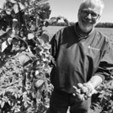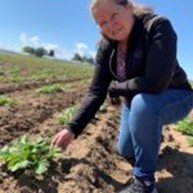2019 Honorary Life Member Selections
Kathleen Hayne
Kathy grew up in upstate New York. She attended LeMoyne College in Syracuse, N.Y. The summer of 1977 she worked for Dr. Richard Robinson in his watermelon, lettuce, cucumber, and squash breeding program at the Plant Introduction Station in Geneva, N.Y. where she fell in love with plant breeding. In her senior year of college, she took classes at three different institutions; finishing up her biology requirements at LeMoyne, taking a soils course at the Forestry School, and an economic botany course at Syracuse University, graduating with a B.S. in biology in 1978. She then headed south and earned an M.S. in plant breeding (1981), a Master of Statistics (1985), and Ph.D. in plant breeding (1986), all at North Carolina State University. All of her graduate work was in potato breeding, first under the direction of Frank Haynes, whom she eventually married, then Wanda Collins (the sweet potato breeder), and then Warren Henderson (the tomato and watermelon breeder). Drs. William Swallow, John Rawlings and Larry Nelson from the Department of Statistics also served on her graduate student committees and were instrumental in encouraging her interest in statistics.
In 1987 Kathy began working as a potato breeder/geneticist for the U.S. Department of Agriculture in Beltsville, Maryland. Over the years she held adjunct professor appointments at The Pennsylvania State University, Inner Mongolia University in Huhot, China, The University of Florida, and the University of Maine. Her research interests in potato breeding were broad and included breeding for disease resistance, especially to late blight and early blight; breeding for stress resistance, primarily to internal heat necrosis and more recently, heat stress; breeding for nutritional quality, primarily for increased carotenoid levels; and, population improvement at the diploid level. For the totality of her time at the USDA, she led a multi-state effort to develop improved potato varieties, primarily for the eastern half of the U.S. The east coast potato mafia, as the state cooperators are affectionately known as, traveled every fall to northern Maine to participate in the USDA and University of Maine potato harvests. Kathy has authored or co-authored over 100 publications on potato breeding during her career, with over 100 different co-authors.
Kathy has been an active participant in the Potato Association of America over the years and rarely missed an annual meeting. She served on the Finance Committee for a number of years, in various positions in the Breeding and Genetics Section, and for a decade on the Graduate Student Competition Committee. While chair of that committee, she established the Frank L. Haynes Graduate Student Awards Competition in honor of her late husband. She has reviewed over 100 manuscripts for the American Potato Journal/American Journal of Potato Research and served as a statistical consultant to the journal.
Outside of the USDA and PAA, Kathy served as the Awards and Advancements Co-chair for Boy Scouts of America Troop 361 for nearly a decade, and was the merit badge counselor for cycling and personal management. For the last decade, Kathy has been a volunteer driver for Neighbor Ride in her community – an organization that drives senior citizens who no can longer safely drive to doctor’s appointments, social outings, etc. She was also a foster parent for a couple of years in the early 2000s. That experience fueled her current desire to adopt an older teenager out of the foster care system – which she is currently pursuing.
Kathy resides in Columbia, Maryland. Her daughter, Liz, currently serves as a Quality Control Officer in the Radiology Department at Stanford University in California. Her son, Ben, serves as a paramedic in the City of Baltimore, Maryland.
John Nordgaard
 John T. Nordgaard of Black Gold Farms, Grand Forks, ND attended every Potato Association of America annual meeting since he became involved in potatoes. He also attended National Potato Council Annual meetings, where he served on chip, potato disease committees. He was one of the lead industry people on the Zebra Research Projects. He also served as industry representative on the National Dickeya Research Committee. John has attended World Potato Congresses. John is very involved with research efforts especially at NDSU. He is a driving force for private variety research with input from a grower perspective.
John T. Nordgaard of Black Gold Farms, Grand Forks, ND attended every Potato Association of America annual meeting since he became involved in potatoes. He also attended National Potato Council Annual meetings, where he served on chip, potato disease committees. He was one of the lead industry people on the Zebra Research Projects. He also served as industry representative on the National Dickeya Research Committee. John has attended World Potato Congresses. John is very involved with research efforts especially at NDSU. He is a driving force for private variety research with input from a grower perspective.
Researchers appreciate John for giving industry perspectives into their research. He shares his knowledge, insights and experience of the effects on the industry of new potato problems such as Zebra Chip and Dickeya. He participates in the following committees: SCRI – Texas Zebra Chip Initiative – Grower Advisor and researcher, Potato Virus – Grower Advisor, Dickeya Research – Grower Advisor, Soil Health Initiative – Grower Advisor, Diploid Breeding Project – Grower Advisor, Northern Plains Potato Growers Association – Research Committee, Frito-Lay – Variety evaluation and selection team member, Potatoes USA – Chip Committee, and the ND Certified Seed Growers Committee.
John is a member of the American Society of Agronomy, the American Phytopathology Society, the Potato Association of America, the Soil Science of America, and the Northern Plains Potato Growers Association
After his MSc at NDSU, John started his professional potato career in 1976 as a scout in the field with Agvise, soon moving on to field research and leadership in the company. In 1997 Black Gold Farms made John part of their team. Black Gold Farms grew from 5500 acres of potatoes in 1997 to 22,000 acres of potatoes today plus 5,000 acres of sweet potatoes and approximately 10,000 acres of rotational crops in 11 states.
John is finding more time these days to enjoy some of his hobbies, such as wood working, gardening and the proverbial hunting and fishing. John makes his home in Grand Fork, but now takes the well-deserved opportunity to enjoy his small farm in Bottineau and his cabin at Lake Metigoshe.
Our appreciation for John’s continued interest in the well-being of the potato industry as a whole made him a worthy recipient of the prestigious award of Honorary Life Membership of the Potato Association of America.
Nora Olsen

Nora’s enlightenment into the potato world began in 1992 when she was fortunate to start a graduate school program at Washington State University. Coincidently, that same year her brother began to grow specialty potatoes in Northeast Washington. This parallel education on both the science and practicality of producing potatoes rooted her interest and dedication of potatoes. Nora’s education was highlighted with the mentorship by HLMs Dr. Larry Hiller and Dr. Robert Thornton as her major professors. It was during graduate school when she attended her first Potato Association of America meeting as a student in the Frank L. Haynes Graduate Student Competition in 1995. After graduating with a M.S. in 1994 and Ph.D. in Horticulture in 1998, Nora joined the University of Idaho as a Potato Specialist located at the Twin Falls and Kimberly Research and Extension Centers. Once again, she was fortunate to have tremendous mentoring from colleagues, HLM’s Dr. Gale Kleinkopf and Dr. Phil Nolte, to start her academic career as a new professor and extension specialist. The availability and uniqueness of the Kimberly Potato Storage Research facility allowed Nora to concentrate her research and extension programs on storage management including disease and sprout control, storage and field management practices for newer cultivars, means to maintain processing and fresh potato quality, and impact of seed physiological age on productivity. Focusing on storage research and management allowed Nora to become globally recognized as an expert in this area. As a state potato specialist, she responded to other research and extension needs such as PVY and other necrotic viruses, zebra chip, food and farm safety, and more recently, bruise management. She has been Director of the Storage Research Facility since 2003 and attained the rank of professor in 2012. Her research career has been varied but highlights include evaluating novel means of sprout control alone and in combination programs, sprout control options for phytosanitary issues, post-harvest management in combination with the use of phosphites and other products for disease control, and early storage management for quality. During her time at the University of Idaho Nora has presented over 400 extension and scientific presentations and authored or co-authored over 330 scientific and extension deliverables.
Nora was so captivated by her first PAA meeting 24 years ago, that no year has passed without attending an annual meeting. She quickly became involved in the PAA participating in numerous committees and activities within the organization. Nora was chair of the Extension section, Production and Management section, and twice chair of the Physiology section. Inspired by her own graduate experience at PAA, she was a member of the Frank L. Haynes Graduate Student Competition committee for four years. She encouraged and supported her graduate students and support staff to participate at PAA meetings. Nora’s potato career started with exceptional mentoring and experiences as a graduate student, so she was thrilled to organize the inaugural graduate student networking activity at the PAA meeting in 2016. Collaboration has been a highlight and a reward of her career, therefore she greatly appreciated receiving the PAA Outstanding Extension Project Award in 2012 with her colleagues on their efforts on “Storage management of new potato cultivars”. In addition, Nora enjoyed being a collaborative member or co-chair of three PAA symposium committees and even participated as a symposium speaker at the historic Fargo theatre in 2017. Honored moments in Nora’s career were her term as a PAA Director, subsequent nomination for vice-President, and succession to President in 2013/14. This marked the occasion of the first female President of the PAA. She further enjoyed the challenge and camaraderie as co-chair of the Local Arrangements Committee with Bret Nedrow when Idaho hosted the PAA annual meeting in Boise in 2018.
Dedicated to furthering potato science and the global potato industry, Nora has been greatly involved in the World Potato Congress, as a speaker, and as a Director since 2014. Participating in global actions advancing the significance of potatoes has been extremely rewarding and a continued focus of her career.
Nora still helps out on the family potato farm from cutting seed potatoes in the spring to answering her brother’s phone calls on storage in the winter. Nora met her husband Matt, now a sod farmer, at graduate school and they have two teenage daughters—all true potato ambassadors.
Peter VanderZaag

Peter is known globally as an outstanding potato scientist, educator, mentor, innovative potato producer and breeder. He has also contributed to making the humble potato a staple in developing countries where rice has been the number one staple food. This has helped reduce hunger and malnutrition in many areas of the developing world.
Peter’s parents emigrated to Canada from the Netherlands in 1949. They grew potatoes on a farm near Alliston, Ontario. His father was recognized as one of the best potato growers in the area, the result of hard work and dedication. Peter’s potato education started when he was 6-years-old helping his father to grade potatoes. After completing his B.Sc. at Cornell University, Peter spent two years in Bangladesh doing volunteer work on Crop Diversification with the Christian Reformed World Relief Committee. This challenging and rewarding experience resulted in greatly improved potato production for Bangladeshi potato growers. In 1975, Peter was a joint recipient of the Gold Medal Award given by the President of Bangladesh for his work on Crop Diversification. Bangladesh is a special country for Peter: He met his lovely wife Carla during his volunteer work there.
Peter joined the International Potato Center (CIP) after completing his Ph.D. at the University of Hawaii in 1979. His first posting was to develop national potato programs in Rwanda, Burundi, Zaire (now the Democratic Republic of Congo) and Uganda. In 1981, he received the Rwandan Honorary Citizenship Award from the President in recognition of his contribution to the development of Rwanda as a result of directing a very practical program of potato crop improvement.
From 1982 to 1990, Peter worked for CIP as the Regional Director for South-East Asia. In 1986, he initiated and directed CIP’s potato program in China. Due to his dedication and hard work, potato production increased dramatically: the area under cultivation tripled and yields doubled.
Peter was involved in the development and introduction of Cooperation 88, a CIP variety that by 2010 was grown on 390,000 hectares in Southwest China, fifteen years after its release. Cooperation 88 offers durable resistance to late blight, resistance to PVY0 and PVX, excellent culinary quality and an attractive appearance. In recognition of his years of leadership, Peter was one of 100 foreign experts to receive China’s prestigious National Friendship Award in 2014. The award is the nation’s highest honor for non-Chinese citizens and recognizes outstanding contributions to the economic and social progress of China.
In 1990, Peter returned with his wife Carla and their children to Canada. Peter and Carla started their own potato farm, Sunrise Potato Ltd. near Alliston, a business now managed by his daughter Ruth and her husband Nick. In addition to growing 500 hectares of potatoes, Peter started a breeding program to develop processing varieties for long-term storage at lower than normal temperatures. Resistance to common scab, late blight and Colorado potato beetles are also breeding objectives. One of his selections, SP 327 is being evaluated at several locations across Canada. He was instrumental in establishing the Canadian Private Potato Breeders’ Network (CPPBN) in 2011. Private breeders now work closely with the Potato Research Centre, a publicly funded organization, in Fredericton NB. As a founding member, Peter has encouraged new breeders to join the network and participate in these collaborations.
Peter has continued to work closely with the International Potato Center. He joined the Board of Trustees in 2008 and served as Chair from 2009 to 2012. He is now a Visiting Professor at the Joint Academy of Potato Sciences of Yunnan Normal University, China. Peter spends 2 to 3 months annually working with faculty and graduate students on potato research and extension.
In February 2016, Peter was appointed Director of the World Potato Congress (WPC) and Co Chairman of the WPC International Advisors’ Committee. He continues to travel to Asia and Africa as a consultant advising on research and development issues that relate to potatoes in the developing world. He is much sought after as a speaker both in Canada and internationally. Peter has presented over 40 scientific papers at major potato professional conferences. He has authored over 50 publications in refereed journals, several of them published in the American Journal of Potato Research.
For 43 years, Carla has been instrumental in supporting Peter’s extensive international work on potatoes and raising their 6 children.
Rarely, a well-known global potato scientist is also an outstanding potato farmer. Peter is well respected by growers and researchers across Canada. He is constantly evaluating new potato production practices, and best of all, he shares what he learns with others. Those who have worked with him say that he is a passionate scientist and potato producer whose integrity and ethical values are above reproach.
